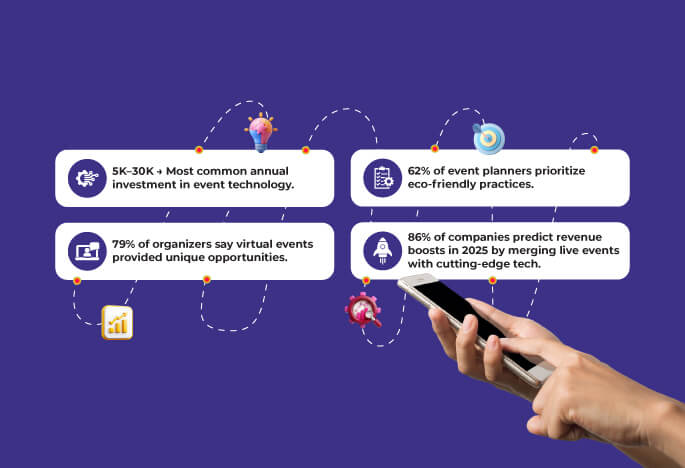The event business is undergoing significant change as a result of technological advancements, changing consumer preferences, and an increased emphasis on sustainability. Without a doubt, these insights and trends in the event business will fundamentally alter the way we organize, carry out, and enjoy events as we move forward into 2025. If you want to be competitive as an event planner, marketer, or business owner, you must stay ahead of these developments.
In this blog, we will discuss the top 13 event industry insights and trends that will influence our vision for 2025. Ranging from eco-friendly tactics and methods that stand out to next-generation event technology. From future hybrid events to the most popular event technology innovations, this blog will provide you with the best information for success in the event industry in 2025 and beyond.

Table of Contents
1. Hyper-Personalization of Events
One of the most significant developments in the event industry for 2025 is hyper-personalization. Attendees now choose events that are tailored to their needs, interests, and preferences rather than generic experiences. Thanks to advancements in event technology, planners can now use artificial intelligence (AI) and data analytics to create experiences that are genuinely tailored to the people they are serving.
In addition to facilitating networking opportunities and personalizing schedules, the AI platform analyzes attendance data and suggests programs based on user preferences. On the other side, attendees are content with the event if they believe their preferences are being met.
In 2025, hyper-personalization will entail far more than just what occurs at the event. Every aspect of the event, including the selection of materials offered, pre-event communications, and post-event follow-ups, will be fully tailored to each participant’s interests, creating an unforgettable experience.
2. Sustainability Takes Center Stage
Sustainability is now required, not just a trendy term. According to event industry insights for 2025, there is a growing need for eco-friendly solutions due to the current trends toward greater ecological consciousness. To lessen their environmental effect, planners are now giving priority to carbon-neutral sites, zero-waste events, and sustainable sourcing. Also, 62% of event planners place a high priority on sustainability, stressing eco-friendly procedures and waste minimization.
Additionally, advancements in event technology are greatly advancing sustainability. AI-enabled resource management systems, virtual event platforms, and digital ticketing are reducing the amount of paper, travel, and energy used. Furthermore, there is a strong commercial rationale for sustainability in event management 2025 since attendees are acting more on their convictions.
3. Hybrid Events Become the Norm
Although hybrid events were already popular before the pandemic, their popularity was pushed by this environment, and by 2025, they will be commonplace. The greatest virtual and in-person experiences are combined in hybrid events, which offer unmatched cost-effectiveness, flexibility, and reach. 79% of event organizers say virtual events provided opportunities they wouldn’t have had otherwise.
Future hybrid event hosting will be simpler than ever because of event technology tools. It is easier to make both virtual and in-person attendees feel included and involved when event systems include integrated live streaming, interactive features, and real-time data.

Holographic presentations and virtual reality (VR) networking spaces will become commonplace in the event industry by 2025 as hybrid events continue to advance. As a result, these event technology solutions will guarantee that there is no separation between the digital and real worlds and that every guest has a completely inclusive experience.
4. Immersive Technologies: AR, VR, and the Metaverse
In 2025, immersive technologies from AR to VR will advance trends in the event sector. Virtual reality (VR), artificial reality (AR), and AR are transforming how people engage with events by offering new ways to participate and interact. It is anticipated that 78% of event planners would use hybrid formats by 2025, which combine AR and VR components to improve audience interaction and engagement.
Imagine navigating a virtual showroom, interacting with 3D models, experiencing a product launch, and testing out items in a realistic environment. Or picture a metaverse meeting where you may interact with holographic avatars. These trends are the new normal; these event technology solutions are not fictitious!
5. AI-Powered Event Management
From planning to execution, artificial intelligence is transforming the event industry in 2025. Repetitive jobs are being replaced by AI-based solutions, which also optimize resource usage and generate insightful data to enhance decision-making.
Chatbots, for instance, are improving customer service by providing participants with immediate responses to their inquiries. Organizers can use predictive analytics to identify patterns and modify their strategy accordingly. Artificial intelligence is radically altering how people experience events, from customized itineraries to focused advertising efforts.
We have seen a number of advancements in event technology that increase the effectiveness of event planning, including AI-driven chatbots, predictive analytics, and intelligent scheduling.
Chatbots with AI capabilities engage with guests in real time.
Using advanced matchmaking algorithms, attendees are matched with appropriate networking opportunities according to their interests.
Event planners can use data analytics to predict how guests will behave and design the event’s structure.
6. Social Media & Influencer-Led Event Marketing
In 2025, almost 86% of companies anticipate a notable boost in revenue after the integration of live event marketing campaigns with cutting-edge technologies. Social media continues to be a major driver of these insights in the event industry. In today’s tech-driven world, social media sites like Instagram, LinkedIn, TikTok, and Facebook are transforming audience engagement and event advertising.

Influencers make use of the event’s reputation and publicity.
A live stream on social media is used to develop virtual attendance.
AI-powered social listening solutions allow event planners to monitor audience attitudes and trends.
7. Focus on Health and Safety Innovations
Health and safety remain top priorities in 2025. Event planners are using cutting-edge techniques, like contactless check-ins and health monitoring applications, to consider the wellness of their attendees. By allowing touchless entry and managing visitor movement, RFID enhances convenience and security.
Next-generation solutions with features like thermal scanners, UV sanitization equipment, and real-time crowd monitoring systems are becoming more and more common at events as event technology develops. However, by providing guests with peace of mind and ensuring safety, these event technology solutions increase attendance.
8. Experiential Marketing Takes Over
Experiential marketing will be popular in the event industry in 2025. Your audience wants to engage and participate; they are not content to simply consume stuff.
Planners are using the latest developments in event technology to craft memorable, interactive experiences. By transforming live demonstrations into an experience through interactive displays, gamified activities, or hands-on seminars, experiential marketing is a contemporary strategy used by marketers to communicate with their audience.
9. The Rise of Event Subscription Models
The event subscription model is one new powerhouse for retaining attendees and generating recurrent revenue. Consumers increasingly value convenience and curated experiences, which are key benefits of subscription services. These include exclusive content, early access, discounts, and premium networking opportunities.
Among them are recurring subscriptions that interact with participants on a monthly or annual basis.
This fosters a sense of community and harmony between a brand and its customers.
Event planners can tailor services to subscribers’ interests by using analytics.
10. Data Privacy and Security in Events
Data privacy and security is a crucial development for the event business in 2025, as more events become data-driven. Attendees’ concerns about the collection, storage, and use of their personal information are growing.
Therefore, it is in the best interests of the organizers to make sure they comply with laws like the GDPR and to use advanced event technology solutions that will safeguard participant data. Establishing confidence and maintaining credibility will require the implementation of transparent data policies, encrypted communication platforms, and secure ticketing systems.
11. Rise of Niche and Micro-Events
Since micro events frequently result in greater engagement rates, almost half (45%) of event professionals have committed to presenting them this year, demonstrating their growing popularity. According to 2025 event industry trends, corporate audiences have a strong preference for niche and micro-events. More involvement, better community building, and more cost-effectiveness are all benefits of smaller, more targeted events.
Event technology trends and platforms that facilitate specialized programming, tailored networking, and customized experiences make it easier to conduct niche events. Micro-events, such as industry-focused conferences or local gatherings, are expected to surpass the event industry by 2025.
12. Integration of Wearable Technology
Wearable technology, such as smart badges, fitness trackers, and others, enhances attendees’ experiences by facilitating networking, providing real-time feedback, and enabling customized interactions.
By enabling guests to take part in interactive events like live polls and scavenger hunts without being distracted by cell phones, Wearable technology enhances engagement. They give planners a real-time, data-driven experience that will not only spark engagement but also contribute data to future refinements.
13. Gamification & Interactive Content for Attendees
An emerging trend in event technology is gamification, which involves presenting guests with challenges and interactive information.
With quizzes, scavenger hunts, and leaderboards, it fosters a participatory environment.
Treasure hunts with augmented reality (AR) are utilized to keep guests interested throughout the event.
Gamification techniques that encourage networking and participation.
Advanced AI-driven gamification tailors challenges and rewards based on attendee preferences, enhancing engagement and participation.
Conclusion
An overview of the event industry’s creative future in 2025. From next-generation event technology and immersive experiences to hyper-personalization and sustainability, these concepts represent the future of events.
These event technology options can assist planners in creating beneficial and memorable experiences for attendees. Don’t wait; you need to start planning for 2025 today. Examine the previously listed event trends, experiment with new technology, and prepare to lead the always-changing holistic events scene.





















